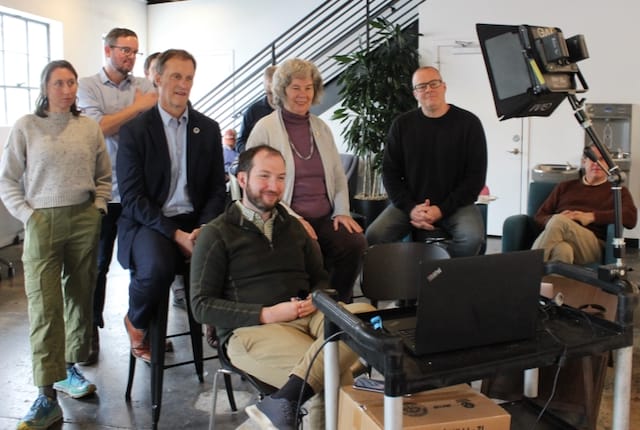
By Bridget Manley, publisher
After navigating several rounds of eliminations, Harrisonburg is now one of two finalists for the Strongest Town Champion — a national online competition that aims to highlight communities dedicated to fostering progress across key areas, like housing, transportation and public safety.
Harrisonburg will face Marion, Ohio, in the final round. Online voting, which is open to anyone, will continue until 1 p.m. Thursday, April 10.
The Strongest Town Contest aims to highlight communities that prioritize safe streets, affordable housing, transportation, and fiscal resilience, according to the competition’s website.
Planning Commissioner Brent Finnegan and KC Kettler, founder of the organization Livable Harrisonburg that seeks to promote affordable housing and sustainable transportation, nominated Harrisonburg. Among the reasons for the nomination were the city’s commitment to selling city-owned surplus land for housing developments and the Downtown 2040 Plan, which aims to address issues such as racial equity, walkability, bike-ability, zoning, and arts and culture.
They also nominated the city for community initiatives, such as the Downtown Harrisonburg Renaissance, the Harrisonburg Food Co-Op, and the Harrisonburg Farmers Market, as well as locally owned companies’ commitment to redeveloping older buildings the way companies like Sage Bird Ciderworks and Broad Porch Coffee have.
Leaders from Harrisonburg and Marion faced off in a Zoom call and YouTube live-streaming on Monday to present their final pitches for why their community should be crowned the Strongest Town Champion.
Members of Livable Harrisonburg, the Shenandoah Valley Bicycle Coalition, and the Harrisonburg Planning Commission and City Council teamed up to advocate for the top position.
As they made their case, Kettler discussed the building used for the broadcast – The Perch, which was once the neglected top floor of a former tire retailer. Developers renovated the building for co-working space on the top floor and featuring a bakery and the Magpie restaurant within the same building, which is just down the street from where Sage Bird converted a garage into their facility.
“I think it was three or four years ago when it was an old auto repair place next to another old auto repair place,” Kettler said. “Now it is a coworking space, an event space, a cidery, a bookstore, and several other businesses. All of that has come from local developers, one piece at a time, on a small scale.”
Kettler said one feature that has allowed for progress is Harrisonburg’s lack of parking minimums.
Parking minimums are zoning regulations that require a minimum number of parking spaces for new developments based on the size of the building. These requirements have several negative effects, such as reducing the walkability of cities, increasing development costs, and obstructing the availability of affordable housing.
Harrisonburg City Council member Laura Dent highlighted the city’s recent opening of a new homeless shelter, as well as plans to build a new fire station, and grants for childcare and mental health.
She also said she appreciated a community where so many people are seeking to make positive changes for the city.
“Now of course, we sometimes have the pushback of people who don’t want this change in their neighborhoods,” Dent said. “My take on that is that it’s all of our neighborhood… We need to grow inward and, to some degree, upward, in the sense of more density to be more walkable, bikeable and livable.”
Finnegan has been updating the city on the developments of the Strongest City Competition through his Substack.
“I’ve enjoyed getting the opportunity to tell the stories of these local organizations and businesses,” Finnegan wrote. “Regardless of how the outcome this week, it’s been great to see our community come together to support this city we love, and want to be better.”
Thanks for reading The Citizen, which won the Virginia Press Association’s 2022 News Sweepstakes award as the top online news site in Virginia. We’re independent. We’re local. We pay our contributors, and the money you give goes directly to the reporting. No overhead. No printing costs. Just facts, stories and context. We value your support.














